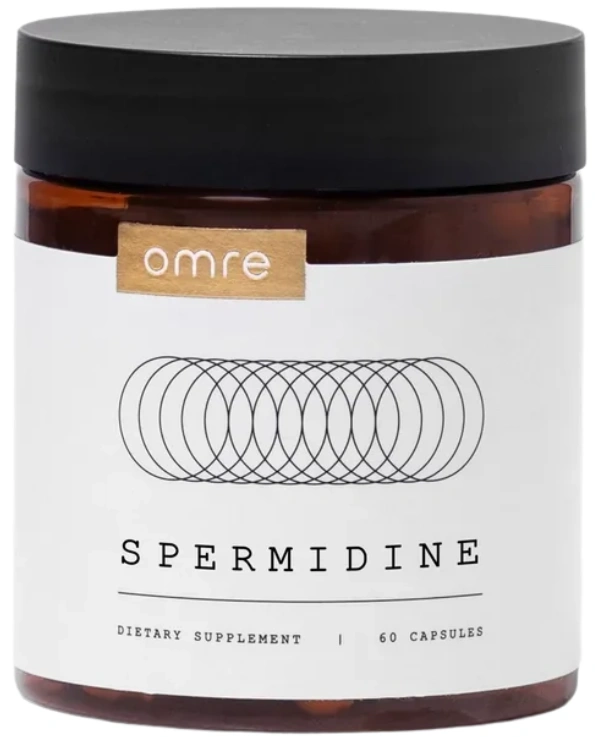Table of Contents
Spermidine may help slow down some signs of aging by supporting cellular renewal, reducing inflammation, and protecting heart and brain health. While studies in animals have been promising, human research is still catching up.
In this article, we’ll walk through what spermidine is, how it works in the body, and what current science says about its role in aging.
You’ll also learn what foods contain spermidine, how it compares to supplements, and whether it’s worth considering if you’re interested in healthy aging.
Cellular autophagy activator, providing a potent and highly purified dose of Spermidine.*SPERMIDINE
What is Spermidine?
Spermidine is a natural compound found in your body and in certain foods. It plays a role in cell growth, repair, and maintenance.
It belongs to a group of compounds called polyamines, which are present in every living cell. These compounds help with things like stabilizing DNA, supporting metabolism, and keeping cells functioning properly.
Your body produces spermidine on its own, but levels tend to drop as you age. You can also get it from foods like wheat germ, mushrooms, soybeans, and aged cheese.
Because of its role in keeping cells healthy and active, scientists have been looking into whether spermidine could help slow down age-related decline.
How Does Spermidine Work?
Spermidine supports a process called autophagy. This is your body’s natural way of cleaning out damaged cells and replacing them with new, healthy ones.
Think of autophagy like your body's internal recycling system. When it's working well, your cells stay in better shape for longer. Spermidine has been shown in studies to trigger this process, especially in animals like mice, yeast, and worms.
In one study published in Nature Cell Biology, researchers found that spermidine extends the lifespan of mice by encouraging autophagy and improving cardiovascular health (1).
Another study showed similar effects in yeast and flies, suggesting that it may have wide-ranging benefits at the cellular level (2).
Spermidine also helps protect mitochondria, the energy producers in your cells. It may reduce inflammation, support your immune system, and help keep tissues like your brain and heart in better condition as you age.
While these findings are exciting, most of the evidence so far comes from animal studies. Human research is ongoing, and the results are mixed.
Is Spermidine Good for Anti-Aging?
-v1747265711065.webp) Early research shows that spermidine has several features that could support healthy aging, but the benefits in humans are still being studied.
Early research shows that spermidine has several features that could support healthy aging, but the benefits in humans are still being studied.
In lab animals, spermidine has been shown to extend lifespan, protect memory, and lower the risk of age-related diseases (3).
For example, a 2021 study found that spermidine reduced blood pressure and improved heart function in mice. It also showed promise for memory and brain health by clearing harmful protein buildup linked to Alzheimer’s (4).
However, the first major human trial published in 2022 didn’t find clear benefits. Older adults who took spermidine for 12 months didn’t see big improvements in memory or cognitive function compared to those who took a placebo.
Researchers think this might be due to the dose or study design, not necessarily because spermidine doesn’t work.
So while spermidine seems helpful for aging based on lab research, we need more high-quality human studies to confirm how well it works in real life.
If you're thinking about trying it, it may be worth discussing with your doctor, especially if you're already focusing on healthy habits like diet and exercise.
SPERMIDINE
Cellular autophagy activator, providing a potent and highly purified dose of Spermidine.*
Anti-Aging Benefits of Spermidine (Research Backed)
Spermidine has gained attention for its potential to slow down the aging process at the cellular level. Here are some of the key anti-aging benefits backed by research.
1. Promotes Autophagy for Cellular Renewal
One of the most important benefits of spermidine is its ability to trigger autophagy, a natural process where your body clears out damaged cells and makes room for new, healthy ones.
Think of autophagy like spring cleaning for your cells. It helps get rid of broken parts and keeps everything running smoothly. This process slows down with age, but spermidine has been shown to activate it again.
A 2021 study in Oxidative Medicine and Cellular Longevity found that spermidine promotes autophagy by blocking a specific enzyme (EP300), which normally suppresses this cellular recycling (5). By doing so, it helps support overall cell function and health as we get older.
2. May Help Preserve Cognitive Function
Brain health often declines with age, and researchers are looking into how spermidine might help keep memory and thinking sharp.
In animal studies, spermidine has been shown to protect neurons, reduce oxidative stress in the brain, and help clear out toxic protein build-ups that are linked to conditions like Alzheimer’s (6).
A study published in Cell Reports showed that spermidine helped preserve cognitive function in aging mice by promoting autophagy in brain cells (7).
However, a human trial in 2022 found that spermidine supplementation did not significantly improve memory in older adults (8). This doesn’t mean it has no benefit, but it shows that more studies are needed to fully understand how it works in people.
3. Supports Cardiovascular Health
Your heart and blood vessels also go through changes as you age. Spermidine has shown potential to help keep them in better shape.
Research in animals suggests that spermidine may lower blood pressure, improve blood vessel flexibility, and reduce the buildup of plaque in arteries (9). These effects may be linked to its ability to support autophagy in cardiovascular tissues.
A study in Nature Medicine found that mice fed a spermidine-rich diet had better heart function and lived longer compared to those that didn’t receive spermidine (10).
Observational data from humans also suggests that diets high in spermidine may be linked to lower risks of heart disease.
4. Reduces Inflammation and Supports Immunity
Chronic inflammation is one of the main drivers of aging and age-related diseases. Spermidine has been shown to reduce inflammation and support immune system balance in several studies.
In a 2020 review published in Aging Research Reviews, researchers noted that spermidine helps regulate immune cells and reduces pro-inflammatory cytokines—small proteins that trigger inflammation (11). This could be one of the ways spermidine protects the body as we age.
While most of the current research is in animals, it does suggest that spermidine might help manage the kind of low-grade inflammation that comes with aging, sometimes called "inflammaging."
5. Longevity Effects in Animal Models
Perhaps one of the most eye-catching findings is that spermidine may extend lifespan in several species.
Studies in yeast, worms, flies, and mice have all found that spermidine supplementation increases lifespan (12). These effects are likely due to its impact on autophagy, improved cardiovascular function, and reduced inflammation.
One landmark study in Nature Cell Biology reported that spermidine-fed mice not only lived longer but also maintained better heart health and physical performance in older age (13).
Of course, just because it works in animals doesn’t mean the same will happen in humans. But these results are encouraging and form the basis for ongoing clinical trials.
6. Supports Mitochondrial Function
Mitochondria are often called the “powerhouses” of the cell because they produce the energy your body needs. As we age, mitochondrial function tends to decline, which affects energy, metabolism, and overall health.
Spermidine appears to protect mitochondria by supporting their cleanup and repair. It also helps regulate their formation and function.
A study published in Cell Death & Disease showed that spermidine improved mitochondrial performance in aging cells, helping them produce energy more efficiently and reducing oxidative stress (13).
This is important because damaged mitochondria are a major contributor to age-related decline.
Is It Safe to Take Spermidine for Anti-Aging?
Yes, spermidine is considered safe for most people when taken at recommended doses. Clinical studies so far have not reported any serious side effects.
Because spermidine is also found in common foods and produced naturally by the body, it tends to be well tolerated. Most supplements offer a purified dose that mimics what you’d get from a spermidine-rich diet, just in a more concentrated form.
Still, if you have any medical conditions or are taking medications, it’s always a good idea to talk to your doctor before starting a new supplement.
Spermidine in Food vs Supplements
-v1747265881871.webp) Spermidine is naturally found in many everyday foods. If you eat a diet rich in whole grains, legumes, and fermented items, you’re already getting small amounts of it.
Spermidine is naturally found in many everyday foods. If you eat a diet rich in whole grains, legumes, and fermented items, you’re already getting small amounts of it.
However, the amount of spermidine in food can vary depending on how it's prepared and your body’s ability to absorb it.
As we age, spermidine levels in our cells tend to decline, and it becomes harder to get enough just from diet alone. That’s one reason some people turn to supplements.
A high-quality spermidine supplement provides a consistent and purified dose that can be easier to track and control, especially if you're trying to support specific health goals like aging well or improving heart health.
Here are some foods naturally high in spermidine:
Wheat germ
Soybeans and natto (fermented soy)
Mushrooms
Aged cheese (like Parmesan)
Legumes such as lentils and chickpeas
Green peas
Broccoli and cauliflower
Whole grain products
While food is a great place to start, supplements can be a helpful option if you're looking for higher or more consistent spermidine intake, especially when paired with other anti-aging nutrients.
Should You Take Spermidine?
Spermidine shows a lot of promise, especially when it comes to supporting cellular health, autophagy, and possibly slowing down aging. But right now, most of the strong evidence comes from animal studies, not humans.
If you’re already focused on eating well, staying active, and managing stress, adding spermidine might offer some extra support, especially for things like inflammation, heart health, and energy. It may be even more helpful when combined with other lifestyle changes.
That said, it’s not a magic pill. It should be viewed as one part of a bigger picture. A good diet, sleep, exercise, and other nutrients like NMN or resveratrol may also play a role.
If you’re curious about trying spermidine, choose a trusted brand that uses high-purity ingredients and clearly lists dosages.
Some supplements also include added nutrients to support absorption and effectiveness.
Conclusion
Spermidine has earned its spot on the radar for anti-aging research. It helps promote autophagy, supports mitochondrial and heart health, and may even protect brain function.
While most of the promising evidence comes from animal studies, early human research is starting to explore its full potential.
If you're thinking of trying a supplement, Omre's Spermidine is a high-purity option crafted with science-backed dosing and ingredient transparency. Check availability and see if it’s the right fit for your longevity goals.
Check availability and see if it’s the right fit for your longevity goals.
FAQs
Does spermidine slow aging in humans?
Not proven yet. Animal studies show strong results, but human trials are still limited and mixed.
Is spermidine better than NMN or resveratrol?
They work in different ways. Spermidine supports autophagy, while NMN raises NAD+ and resveratrol activates sirtuins. Some people use all three together.
What’s the best time to take spermidine?
There’s no strict rule, but many take it with food or in the morning to support daily cellular processes.
Can I get enough spermidine from food alone?
It’s possible, but harder with age. Foods like wheat germ, soybeans, and aged cheese are good sources, though supplements offer a consistent dose.
Is spermidine safe for long-term use?
So far, it appears to be safe when taken as directed, but we still need more long-term human studies to confirm this.





